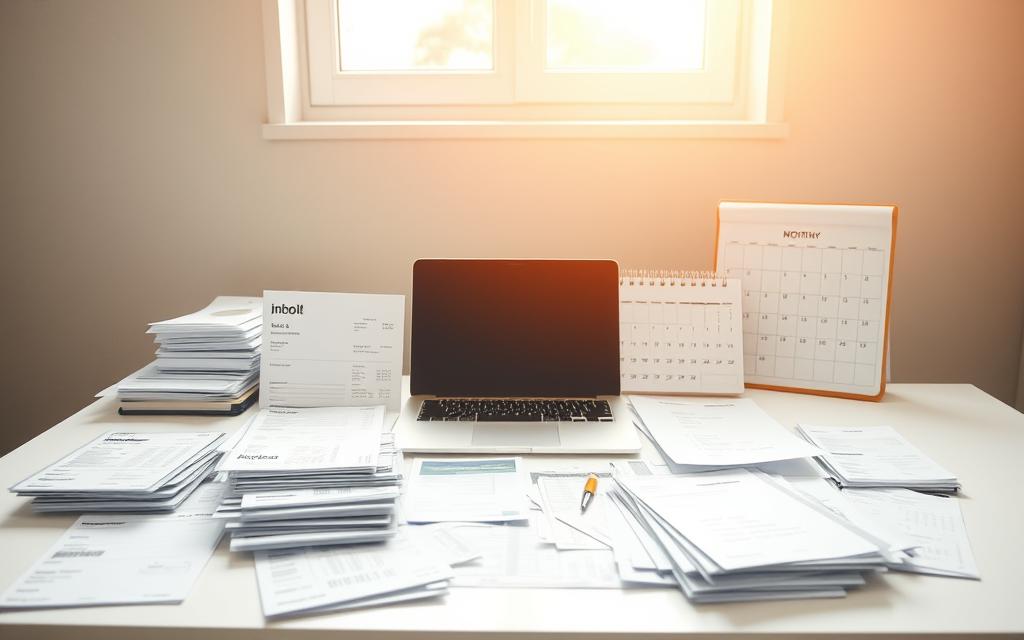Advertisement
Did you know that nearly 70% of Americans feel overwhelmed by their monthly bills? This fact shows how important it is to organize bills well. In this guide, we will share key tips for bill organization. These tips can change how you handle your money.
By making your payment processes simpler and reducing late fees, you’ll feel more confident about your finances. This guide will help you, whether you’re dealing with fixed bills or changing costs. It aims to improve your handling skills and keep you in control of your monthly tasks.
Understanding the Importance of Bill Organization
Keeping bills organized is key to handling money well. Not being tidy with finances can make you miss payments and feel more stressed. Learning how to manage bills better can help your financial health.
The Impact of Disorganized Bills
When bills aren’t organized, big problems happen. Late payments can lead to extra fees and hurt your credit score. The stress of unpaid bills takes your focus away from important things. But, having a good plan for your finances reduces these risks.
Benefits of Staying Organized
Being organized has many benefits. It gives you a clear view of your money, helping you budget better. You can track what you spend each month easily, seeing where you might need to cut back. Organizing bills does more than make life easier; it helps you control your financial future.
How Organization Can Save Money
Organizing your bills properly can save you money. It lets you see unnecessary costs and change your spending habits. Tips like checking your subscriptions and talking down bills can help you save even more. Good bill management makes payments smoother and boosts your financial health.

Types of Monthly Bills to Track
Knowing the types of monthly bills is key to managing your finances well. We divide expenses into fixed and variable bills. This clears up what costs stay the same and which ones might change. With this info, you can plan your budget better.
Fixed Bills vs. Variable Bills
Fixed bills don’t change month-to-month, so they’re simpler to budget for. Things like mortgage payments, car loans, and insurance premiums are fixed bills. On the other hand, variable bills can go up or down. Groceries and utility bills are good examples. Understanding these differences helps in creating a more precise budget.
Recurring Payments and Subscriptions
It’s vital to keep an eye on recurring payments and subscriptions to dodge unexpected charges. Tracking subscriptions makes you aware of all the services you’re paying for. These could be streaming services, software, or gym memberships. Forgetting these payments can lead to surprise costs. Checking your subscriptions regularly helps you spend smarter.
Utility and Service Providers
Utility and service providers usually have different ways of billing that need careful monitoring. Keeping track of these bills helps prevent missed payments and late fees. Typical utility bills are electricity, water, and gas, which depend on how much you use them. An organized system for these bills makes managing your finances easier and ensures you pay on time.

Tools and Resources for Bill Organization
Managing monthly bills can be easier with the right tools. Today, we have technology to help us organize our finances. Digital applications for bill tracking are popular because they’re easy and efficient to use.
But, traditional methods are still useful, especially for those who like a more hands-on way. Using budgeting software also helps. It shows an overview of financial health, improving how you manage money.
Digital Apps for Bill Tracking
Digital apps for tracking bills offer helpful features. For instance, apps like BillOut let users make their own bill calendars, remind them when payments are due, and organize expenses. These apps can fill in information automatically and update you with the latest data. This helps a lot in making sure bills are paid on time.
Traditional Methods: Paper vs. Digital
Paper and digital ways of organizing have their benefits. Using paper methods like folders and binders allows for a physical way to sort bills. Digital methods, however, offer quick access and organization with cloud storage and instant updates. By combining both methods, you can manage your bills more effectively.
Budgeting Software Recommendations
Adding budgeting software to your financial planning increases clear understanding and control. Programs like Mint and You Need A Budget (YNAB) help with tracking spending and categorizing bills. They also help analyze your spending habits. By keeping all financial info in one place, budgeting software makes the process smoother and helps you make better choices about your monthly spending.
Setting Up Your Monthly Bill Organizer
Starting a monthly bill organizer can make handling your finances much simpler. Begin with a bill calendar. It’s a great tool for keeping track of when payments are due. This helps you manage your money better. Then, sort your bills by due dates to keep payments in order. This ensures you don’t miss anything. Lastly, using colors for different bills gives you quick visual reminders. This helps you stay organized and avoid forgetting any payments.
Creating a Bill Calendar
A bill calendar is key for tracking financial due dates. Choose between a physical or digital calendar based on what you like. Here’s what to do:
- Mark each bill with its due date.
- Include reminders a week before to reduce stress.
- Update your calendar monthly for any new bills or changes.
Organizing Bills by Due Dates
Putting bills in order by their due dates helps manage money well. List them in the order they need to be paid. Also, categorize them by type, like utilities or loans. This helps avoid late fees and keeps you aware of what’s due next.
Color-Coding System for Easy Reference
Using colors for bills makes it easier to see when they’re due. Assign specific colors to different types of bills:
| Bill Type | Color Code |
|---|---|
| Utilities | Blue |
| Loans | Green |
| Subscriptions | Yellow |
| Credit Cards | Red |
This system not only organizes but also makes it fast to find what you need. This lessens the chance of missing payments.
Tips for Efficient Bill Management
Managing bills efficiently is key to keeping your money in check. Adopting smart habits can make paying bills less stressful. These steps can make your financial life smoother.
Automating Payments
Setting up automatic payments saves you time. Bills get paid on time, avoiding late fees. Most banks and services let you automate payments for things like rent or subscriptions. This way, you don’t have to worry about forgetting a payment.
Regularly Reviewing Bills
Checking your bills regularly is a smart move. It helps you spot mistakes and understand your spending. By doing this, you can tweak your budget and plan better for the future. Keeping an eye on your expenses can also help you find ways to save.
Setting Reminders for Payment Due Dates
Reminders can stop you from paying late. Use digital calendars or apps to keep track of due dates. Many apps let you set up notifications to warn you ahead of time. This practice helps you avoid late fees and keeps your finances healthy.
How to Handle Unforeseen Expenses
Handling sudden costs can be tough without a plan. Creating a safety net, or an emergency fund, is key. It helps you pay for surprises without messing up your budget.
Creating an Emergency Fund
An emergency fund should cover up to six months of your costs. It’s there to help in case of unexpected events like health issues or car fixes. Adding money to this fund regularly can make you more financially secure and less worried during hard times.
Review and Adjust Your Budget
Checking your budget often lets you tweak it for unexpected bills. You can cut back on extra spending to save more. This way, you’re ready for any surprises and keep a tight grip on your finances.
Utilizing Payment Plans
Many places offer payment plans for big, sudden bills. It could be for a doctor’s visit or fixing your home. Splitting the cost into smaller parts can make it easier to handle. Always talk to your provider to see what options fit your budget best.
Tracking Bill Payments Effectively
Tracking your bills effectively is key to budgeting well at home. By keeping a detailed log of payments, you can easily track what’s paid and when. This ensures on-time payments and helps find any errors over time.
Keeping a Payment Log
Using a payment log is a great way to keep an eye on bills. In it, list the payment’s date, amount, and how you paid. Keeping this log updated helps with expense management and promotes being responsible with money. Here’s how to set up your log:
| Date | Bill Type | Amount | Payment Method | Status |
|---|---|---|---|---|
| 01/01/2023 | Electricity | $100 | Credit Card | Paid |
| 01/05/2023 | Internet | $60 | Debit Card | Paid |
| 01/10/2023 | Water | $30 | Check | Pending |
Verifying Payment Confirmation
It’s important to make sure your payments are confirmed. After paying a bill, always look for a confirmation through email or apps. Then, write these confirmations in your log to keep track.
Reconciliation of Bank Statements
Matching your bank statements with your payment log is crucial. It ensures the accuracy of your bill tracking. This step helps spot any mistakes, keeping your financial records straight. By doing this regularly, you can quickly fix any issues, keeping your finances accurate.
Avoiding Late Fees and Penalties
It’s key to manage bills well to keep away from late fees that hurt your wallet. Knowing about grace periods helps you pay on time. It’s also important to realize that late payments can lower your credit score. Using reminders and paying bills early helps avoid these problems.
Understanding Grace Periods
Grace periods differ depending on who your bill is with. Learning each one’s specific rules can save you from extra fees. This knowledge helps you plan your finances better.
Impact of Credit Ratings
Not paying bills on time can badly hurt your credit score. This score affects getting loans and good interest rates. A missed payment can stick on your report for seven years, so always pay on time.
Strategies to Prevent Late Payments
- Set up automatic payments for recurring bills to ensure timely processing.
- Utilize calendar alerts or reminders one week before payment due dates.
- Regularly review your financial statements to track upcoming due dates.
- Create a budgeting plan that includes all monthly obligations to anticipate cash flow needs.
Analyzing Your Spending
Checking how you spend money regularly can really help your finances. By looking at your expenses every month, you get a good view of where your money goes. You’ll see what you don’t need to spend on and find ways to budget better.
Monthly Review Practices
Start a routine for reviewing expenses every month. Keep track of spending in each area using a spreadsheet or an app. This helps you see what’s going on with your money. Try to:
- Gather all receipts and statements
- Compare actual spending against your budget
- Analyze spending patterns for inconsistencies
Identifying Unnecessary Expenses
Look out for costs that don’t fit your financial plans in your monthly checks. Some expenses you might not need include:
- Subscriptions you rarely use
- Impulse buys that mess up your budget
- Too much eating out when you could cook at home
Spotting these expenses helps you spend smarter and shows why it’s important to tweak your budget.
Adjusting Your Budget Accordingly
After reviewing, change your budget to better meet your needs. Save more by cutting back on optional spending. You might also put more money into savings or investments. By doing this, your budget will better reflect your financial goals, helping you stay stable in the long run.
Conclusion and Next Steps
As you finish your journey in organizing bills, you should easily use the tips from this guide. Setting reminders and keeping a bill calendar are key to staying on track. Review your bills often to stay ahead of any problems.
Being organized helps with more than just current bills; it’s key for lasting financial health. Use self-discipline and planning tools to boost your success. Whether you prefer apps or paper, stick to what works for you.
Also, keep learning about finances. Look into new ways to budget and stay alert for classes or online resources. A good knowledge base will boost your bill management and overall money health.



